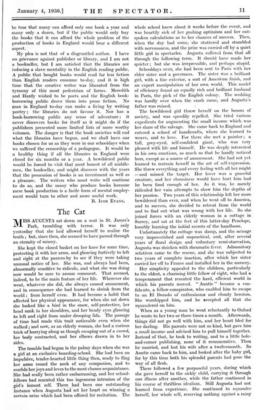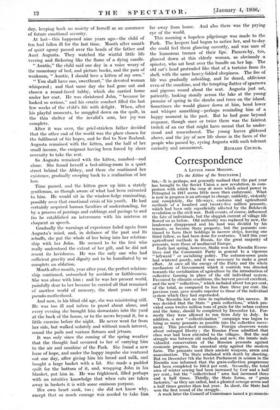The Cat
MISS AUGUSTA sat down on a seat in St. James's Park, trembling with terror. It was only yesterday that she had allowed herself to realize the truth ; but, since then, she seemed to have passed through an eternity of misery.
She kept the closed basket on her knee for some time, protecting it with her arms, and glancing furtively to left and right at the passers-by to see if they were taking unusual notice of her. She was, and always had been, abnormally sensitive to ridicule, and what she was doing now would be sure to arouse comment. That seemed, indeed, to be the main feature of her life. Wherever she went, whatever she did, she always caused amusement, and in consequence she had learned to shrink from the 'world ; from herself even. It had become a habit that affected her physical appearance, for when she sat down she looked like a bird in the snow, self-protective, her head sunk in her shoulders, and her beady eyes glancing to left and right from under drooping lids. The passage of time had made this trait noticeable even when she walked ; and now, as an elderly woman, she had a curious trick of hurrying along as though escaping out of a crowd, her body contracted, and • her elbows drawn in to her sides.
The trouble had begun in the palmy days when she was a girl at an exclusive boarding-school. She had been an impulsive, tender-hearted little thing then, ready to fling her arms round the neck of any companion, and to confide her joys and loves to the most chance acquaintance. She had really been rather embarrassing, and her school- fellows had resented this too ingenuous intrusion of the girl's inmost self. There had been one outstanding instance when Augusta' had set her 'heart on winning a 'certain nrize which had been offered for recitation. The whole school knew about it weeks before the event, and was heartily sick of her gushing optimism and her out- spoken calculations as to her chances of success. Then, when the day had come, she stuttered and stumbled with nervousness, and the prize was carried off by a quiet little girl in spectacles. Augusta suffered from that all through the following term. It should have made her quieter ; but she was irrepressible, and perhaps stupid. Schooldays over, she had been sent to Paris with her elder sister and a governess. The sister was a brilliant girl, with a fine exterior, a sort of American finish, and an expert manipulation of her own world. This model of efficiency found an equally rich and brilliant husband in Paris, the pick of the English colony. The wedding was hardly over when the crash came, and Augusta's father was ruined.
The bewildered girl threw herself on the bosom of society, and was speedily repelled. She tried various expedients for augmenting the small income which was her share of the salvage. She came back to•England and entered a school of handicrafts, where she learned to weave, and to love. For there she met a painter ; a tall, grey-eyed, self-confident giant, who was very pleased with life and himself. He was deeply interested in his own emotions, so much so that he hardly noticed hers, except as a source of amusement. She had not yet learned to restrain herself in the art of self-expression.
She threw everything and every feeling with all her might —and missed the target. Her lover was a graceful creature, and her clumsiness would have hurt him had he been fond enough of her. As it was, he merely ridiculed her vain attempts to show him the depths of her passion. Two years of this relationship left her more bewildered than ever, and when he went off to America, and to success, she decided to retreat from the world and to find out what was wrong with her life. So she joined forces with an elderly woman in a cottage in Surrey, and sat at the feet of this latter-day Penelope, humbly learning the initial secrets of the handloom.
Unfortunately the cottage was damp, and the menage very impoverished and unpractical, and, after several years of floral design and voluntary semi-starvation, Augusta was stricken with rheumatic fever. Admonitory relatives came to the rescue, and she was subjected, to two years of complete inaction, after which her sister carried her off to France and installed her in the nursery. - Her simplicity appealed to the children, particularly to the eldest, a charming little fellow of eight, who had a temperament that resented the hard, efficient world in which his parents moved. " Auntie " became a con- Eda nte, a fellow-conspirator, who enabled him to escape to an El Dorado of enthusiasms and cloudy heroism. She worshipped him, and he accepted all that she squandered on him.
When as a young man he went reluctantly to Oxford he wrote to her two or three times a month. Afterwards, things did not go well with him, and her heart bled for her darling. His parents were not so kind, but gave him a small income and advised him to pull himself together.
Instead of that, he took to writing, and to a little hole- and-corner publishing, none of it remunerative. Then he married, and lost his wife after a twelvemonth. So Auntie came back to him, and looked after the baby girl, for by this time both his splendid parents had gone the way of all flesh.
There followed a few purposeful years, during which she gave herself to the sickly child, carrying it through one illness after another, while the father continued in his course of thriftless idealism. Still Augusta had not learned from experience. She continued to squander herself, her whole self, reserving nothing against a rainy day, keeping back no moiety ofherself as an • assurance of future emotional security.
At last—this happened nine years ago—the child of ten had fallen ill for the last time. Month after month of quiet agony passed over the heads of the father and Aunt Augusta. They watched the wistful little life veering and flickering like the flame of a dying candle.
"Auntie," the child said one day in a voice weary of the monotony of bed, and Picture books, and the. pain, of weakness, "Auntie, I should love a kitten of my -own."
"You shall have one, sweetheart," the devoted woman whispered ; and that same day she had gone out and chosen a round-faced tabby, which she carried home under her coat. Ile was christened John, "because he looked so serious," and his erratic conduct filled the last few weeks of the child's life with delight. When, after his playful moments, he snuggled: down on the quilt, in the thin shelter of the invalid's arm, her joy was complete.
After it was over, the grief-stricken father decided that the other end. of the world was the place chosen for the fulfilment of his hopes, and he fled to New Zealand: Augusta remained with the kitten, and the half of her small income, the emigrant having been forced by sheer necessity to take the rest.
So Augusta remained with the kitten, numbed—and alone. She found herself a bed-sitting-room in a quiet street behind the Abbey, and there she continued her existence, gradually creeping back to a realization of her loss.
Time passed, and- the • kitten grew up into a stately gentleman, as though aware of what had been entrusted to him. He would sit in the window-ledge ruminating, possibly over that emotional crisis of his youth. He had certainly acquired human faculties of understanding, for by a process of purrings and rubbings and pacings to and fro he established an intercourse with his mistress as eloquent as speech.
Gradually the warnings of experience faded again from Augusta's mind, and, in defiance of the past and its rebuffs, she put the whole of her being into her relation- ship with her John. He seemed to be the first whO really understood the extent of her gift, and he did not resent its lavishness. He was the only one who had sufficient gravity and dignity not to be humiliated by so complete an oblation.
Month after month, year after year, the perfect relation- ship continued, untouched by accident or faithlessness. She was alone with him ; and he was her present world, painfully dear to her because he carried all that remained of another world of memory, the short years of her pseudo-motherhood.
Arid now, in his blind old age, she was ministering still. He was too ill and infirm to prowl about alone, and every evening she brought him downstairs into the Yard at the back of the house, or to the mews beyond it, for a little exercise before the night. He never went far from her side, but walked sedately and without much interest, round the pails and . various flotsam and jetsam.
It was only since the coming of the spring weather that the thought had occurred to her of carrying him to the air and sunshine of the Park. She found a new lease of hope, and under the happy impulse she ventured out one day, after giving him his bread and Milk, and bought a large basket with a lid. She made a padded quilt for the bottom‘ of it, and, *rapping Rain in his blanket, put him in. He was frightened, filled perhaps with 'an intuitive knowledge that when eats 'are taken away in baskets .it is with some ominous purpose. .
Her own heart sank, too ; she did not know why, except that so nuieh courage was needed. to take him. far away from home. And also there was the prying eye of the world. This morning a hopeless pilgrimage was Made to the Park. The keepers had begun to notice her, and to-day she could feel them glancing covertly, and was sure of the humorous tremor of their lips: Passers-by, too, glanced down at this elderly woman, so obviously a spinster, who sat bent over the bundle on her lap. The old cat's head protruded like that of. a tortoise from its shell, with the same heavy-lidded sleepiness. The fire of life was gradually subsiding, and he dozed, oblivious- even of the sunshine, and the tempting flutter of sparrows and pigeons round about the seat. Augusta just sat, patiently, looking stonily across the lake at the young' promise of spring in the shrubs and trees on the island. Sometimes she would glance down at him, bend lower. and whisper something—perhaps reminding him of a happy moment in the past. But he had gone beyond response, though once or twice there was the faintest twitch of an ear that might have meant that he under- stood and remembered. The young leaves glittered above, and the joy of new life shone in the faces of the people who passed by, eyeing Augusta with such tolerant











































 Previous page
Previous page